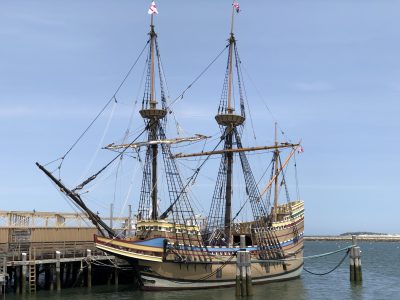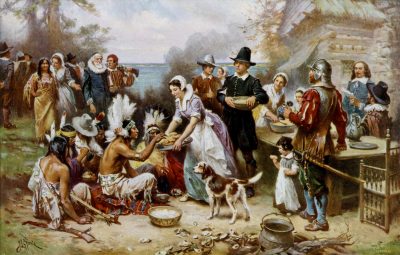The Pilgrim’s First Celebration of Thanksgiving
 On April 5th of 1621, Mayflower left Cape Cod’s Plymouth harbor to return to England. While anchored for five months, half of its crew had perished. The Pilgrim colonists’ numbers had also declined dramatically. Of the 102 Mayflower passengers who arrived in December 1620, only 53 survived the terrible sickness that swept through the makeshift colony during its first brutal New England winter.
On April 5th of 1621, Mayflower left Cape Cod’s Plymouth harbor to return to England. While anchored for five months, half of its crew had perished. The Pilgrim colonists’ numbers had also declined dramatically. Of the 102 Mayflower passengers who arrived in December 1620, only 53 survived the terrible sickness that swept through the makeshift colony during its first brutal New England winter.
Of the survivors, four were married women with thirteen young children, only twenty-two were men, nine were adolescent boys, and five were adolescent girls. They included Constance Hopkins, my ninth great-grandmother who was just fourteen.
After the brutal winter and sickness, the community provisions were sparse. As spring arrived, crops needed planting to feed the survivors. God provided indigenous peoples’ help and tutelage of how to plant corn by fertilizing the sandy soil with a herring for each stock. They also showed the colonists where best to catch fish. Otherwise, they never would have had enough food to make it through the most difficult of times. With the natives help, God provided the colonists with an abundant crop throughout the summer and into the fall. Their strong faith in God’s goodness saved them.
William Bradford, governor of the colonists, called for a celebration of the fall harvest. He wanted to offer thanksgiving to God for their survival so far in America. The celebration occurred most likely in mid-late October, and the adolescent girls were the primary servers, including my ancestor, Constance Hopkins. The colony’s ruling elder, Edward Winslow, wrote an eyewitness account.
“Our harvest being gotten in, our governor sent four men on fowling, that we might after a special manner rejoice together, after we had gathered the fruits of our labors… [it] served the Company almost a week… many of the Indians coming amongst the rest their greatest king Massasoit, with some ninety men, whom for three days we entertained and feasted and they went out and killed five deer, which they brought to the Plantation and bestowed on our Governor… and others. And although it be not always so plentiful, as it was at this time with, yet by the goodness of God, we are so far from want, that we often wish you partakers of our plenty.”[1]
after a special manner rejoice together, after we had gathered the fruits of our labors… [it] served the Company almost a week… many of the Indians coming amongst the rest their greatest king Massasoit, with some ninety men, whom for three days we entertained and feasted and they went out and killed five deer, which they brought to the Plantation and bestowed on our Governor… and others. And although it be not always so plentiful, as it was at this time with, yet by the goodness of God, we are so far from want, that we often wish you partakers of our plenty.”[1]
William Hilton, a passenger on the ship Fortune which arrived in November 1621, wrote a letter after the harvest celebration making this observation. “Our company are… very religious, honest people; the word of God sincerely taught us every Sabbath; so that I know not anything a contented mind can here want.”[2]
This Thanksgiving, when we celebrate God’s bounty and His providential care, let’s lift a special prayer with our families and friends to the ones who gave a special thanksgiving prayer to God on Cape Cod. We are all truly blessed by what God did for the Plymouth colonists more than four hundred years ago, and for what He has done, is doing, and will do in the future for us.
Thanks be to God!
Happy Thanksgiving Everyone!
**
[1] Edward Winslow, Mourt’s Relation (London: 1622)
[2] Alexander Young, Chronicles of the Pilgrim Fathers. (Boston: Little and Brown, 1841)